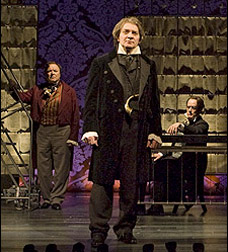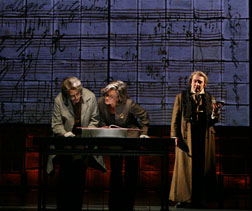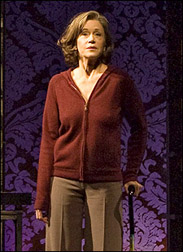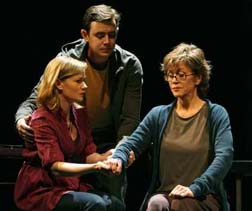By Lucy Komisar
What moves the creative and intellectual mind? Where does beauty lie? Those questions animate “33 Variations,” the provocative play written and directed by Moisés Kaufman and starring Jane Fonda. The production doesn‘t quite reach the level of intellectual stimulation to which it aspires, but it deserves plaudits for dealing with ideas as well as sentiments.

The device is that in 1819 Vienna, music publisher Anton Diabelli (Don Amendolia) has asked 50 important composers to create a variation on his rather simple waltz theme. Beethoven (Zach Grenier) becomes fascinated by the challenge and creates not one but 33 variations over a period of several years, refusing along to way to turn in the works he’s completed because he insists there‘s more to be done.
In the present, musicologist Dr. Katherine Brandt (Jane Fonda), has gone to Beethoven‘s birthplace, Bonn, to search the archives for why the composer, in the midst of creating his great Mass and Ninth Symphony, took time to write the Variations. And why he insisted on doing so many.
She wonders, “What was it about this mediocre waltz?” Or maybe he just needed the 80 ducats. She reads his notebooks and music sketches. A highlight of the production is pianist Diane Walsh playing the music as it is discussed.

I stopped backstage after the performance with a friend who knows Fonda from the anti-Vietnam War movement. I asked her what the message of the show is. She said, “Slow down, and even simple things are beautiful.”
But it‘s also about the character of creative and intellectual minds, the insistence that nothing will interfere with their work. Both Beethoven and Brandt are physically afflicted. Beethoven is assaulted by stomach gout, ringing in his ears and finally total deafness.
Brandt is struck by ALS, amyotrophic lateral sclerosis, known as Lou Gehrig‘s disease, which atrophies the muscles. There is no cure, Kaufman says through Brandt, because not enough people get it to make it financially worthwhile for drug companies to look for one. She has perhaps a few years to live.

We discover that Beethoven refused to turn in the variations though he needs the money “because there are more.” And it was an artistic challenge to find them.
The strength of the show is the portrayal of those two tough kindred spirits. Grenier is a great character actor. He does a stunning scene in which he talks through the changes in tone, speed, and loudness of his pieces as pianist Diane Walsh performs them.
The effective set by Derek McLane includes tall screens with actual pages of music that allow us – especially the musically literate – to follow the themes as they are played.
Brandt, as she fails physically, insists on going ahead with her research. Fonda is compelling, mixing the strength and grace of her character in a cool, steady fashion without falling into the trap of overacting.

The play shifts between the 1800s and the present. I liked the 1800s best. Some of the present descends into sit-com. A dating scene between Katherine‘s daughter, Clara (Samantha Mathis) and a nurse, Mike (Colin Hanks) conjured up a famous old Nichols and May bit. Their relationship is tiresome and never believable. Kaufman inserts a sexist and dramatically unnecessary moment when he has Clara pull off her blouse to reveal her breasts before embracing her lover.
An underlying point that is almost missed is that mother and daughter are both strong women, even though Clara unaccountably has an unusual idea about achievement, thinking she ought to move on to another career when she has succeeded in the first.
Don Amendolia is good as the music publisher, and Susan Kellermann delivers a fine performance as a didactic, stereotypically Germanic archivist.
“33 Variations.” Written & directed by Moisés Kaufman. Tectonic Theatre Project at Eugene O’Neill Theatre, 230 West 49th Street. 212-239-6200. Opened March 9, 2009, closes May 24, 2009. Reviewed by Lucy Komisar March 12, 2009. http://www.tectonictheaterproject.org/Tectonic.html.
Review on NY Theatre-Wire site.

